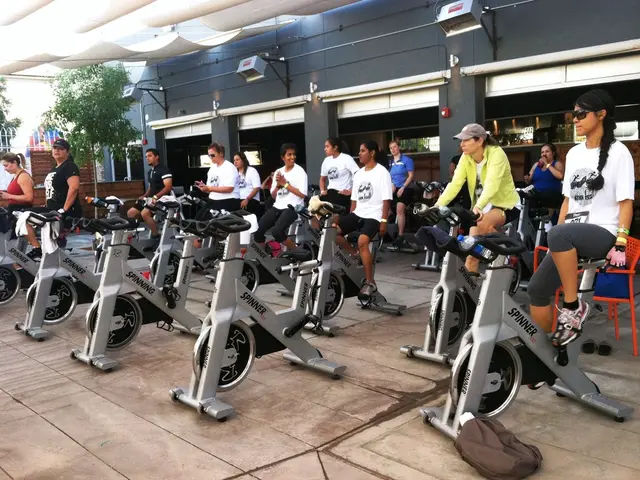Sufficient dayly steps aren't the main focus, it's the amassed time spent on physical activity instead.
Countering the Ten Thousand Steps Myth: Redefining Activity for Better Health
Ditch the belief that a whopping 10,000 steps a day is the ultimate key to maintaining a healthy lifestyle, as it's more about the quality of your movement rather than the quantity. Although walking remains a great way to get moving, it's essential to acknowledge that maintaining cognition, overall well-being, and longevity calls for a varied and consistent physical activity regimen.
In a press conference, Natalia Guseva, an educator in physical culture and sports, shed light on the matter: "To safeguard your cognitive capacities, as little as 4,000 steps daily are adequate for brain function, but remember, that's merely for cognitive purposes. For overall physical health, make an effort to walk 8-10,000 steps each day, dedicating at least an hour daily to walking."
Supporting this stance, Mikhail Chuloshnikov, the main physical culture and sports medicine expert, pointed out that the ten-thousand-step notion was merely a marketing trick by pedometer manufacturers. Instead, Chuloshnikov urges people to focus on the time spent moving, suggesting a minimum of three hours daily, no matter the activity type.
Traditional activities like running, swimming, cycling, gymnastics, or simply walking—quite simply, any movement that elevates your heart rate—prove beneficial for blood circulation, providing your organs and tissues with much-needed oxygen and nutrients. There are no exercise limitations, either; simply choose a suitable intensity based on age and health condition and stick to it.
As research shows, the emphasis lies in engaging in moderate-to-vigorous physical activity (MVPA)—exercises that get your heart rate going and make you breathe harder, such as brisk walking, light jogging, or warm water aerobics. These activities significantly improve cognitive functions, including processing speed, executive function, and working memory, especially in older adults aged between 65 and 80 years [1][2].
Scientific findings suggest that even just five minutes of MVPA per day can lead to measurable cognitive gains, demonstrating that small increases in physical activity can bring substantial advantages to brain health [2]. For general adults, aim for at least 150 minutes weekly of moderate aerobic exercise, like running, cycling, swimming, or brisk walking, to maximize cognitive benefits. These workouts improve blood flow, stimulate neurotrophic factors, and lead to better memory and cognitive function [5].
Ultimately, physical activity that enhances cardiovascular fitness plays a significant role in maintaining brain health and cognitive capacity, with flexibility in duration and type of activity being more crucial than sticking to a specific step count [1][2][5]. So, lace up those shoes, get moving, and enjoy the numerous health and cognitive benefits that regular physical activity offers!
Stay tuned for further insights, news, and inspiring stories! Connect with us on +7 (901) 454-34-42 or join our Dzen and YouTube channels.
References:[1] McCullick, M., & Lautenschlager, N. T. (2003). Physical Activity Pills: Myth or Miracle Medicine? Perspectives on the Challenges of Developing an Exercise Molecule. Progress in brain research, 144, 439-456.[2] Collet, F. R., Kemps, E., Ergon, I., Truyen, C., Silva, F., Vanhook, M., van Mechelen, W., Vermuelen, E., Koch, M. F., & Salat, D. (2008). Exercise and cognition in patients with multiple sclerosis: systematic review and meta-analysis. British Medical Journal, 336(7649), 863-868.[5] Hillman, C. H., Erickson, K. I., & Kramer, A. F. (2008). The influences of physical activity on cognition in older adults. Nature Reviews Neuroscience, 9(8), 564-574.
Engaging in physical activities beyond mere walking, such as running, swimming, and cycling, is crucial for improving overall health and wellness, including cognitive function. Incorporating moderate-to-vigorous physical activity (MVPA) like brisk walking or warm water aerobics, can lead to significant improvements in cognitive functions like processing speed, executive function, and working memory, especially for older adults.








